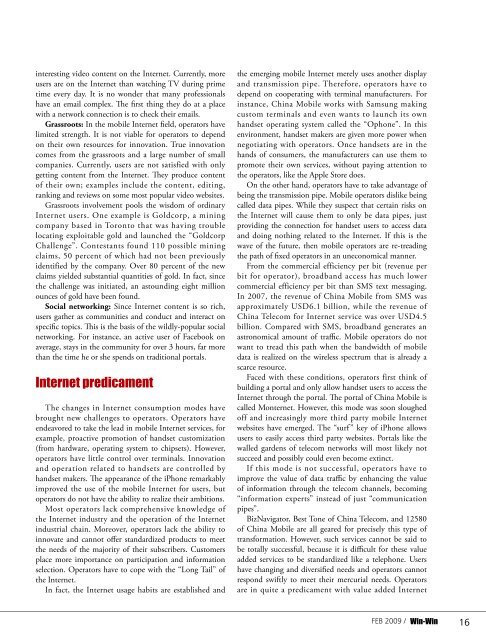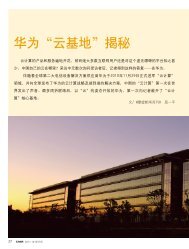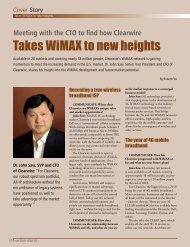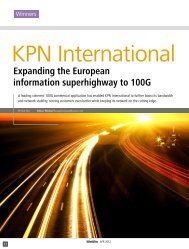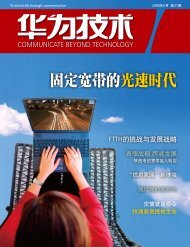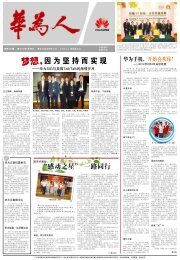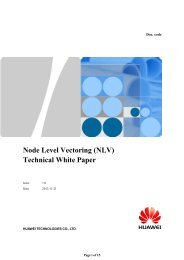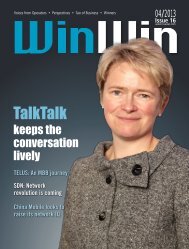EMOBILE: the mobile broadband revolutionist - Huawei
EMOBILE: the mobile broadband revolutionist - Huawei
EMOBILE: the mobile broadband revolutionist - Huawei
You also want an ePaper? Increase the reach of your titles
YUMPU automatically turns print PDFs into web optimized ePapers that Google loves.
interesting video content on <strong>the</strong> Internet. Currently, more<br />
users are on <strong>the</strong> Internet than watching TV during prime<br />
time every day. It is no wonder that many professionals<br />
have an email complex. The first thing <strong>the</strong>y do at a place<br />
with a network connection is to check <strong>the</strong>ir emails.<br />
Grassroots: In <strong>the</strong> <strong>mobile</strong> Internet field, operators have<br />
limited strength. It is not viable for operators to depend<br />
on <strong>the</strong>ir own resources for innovation. True innovation<br />
comes from <strong>the</strong> grassroots and a large number of small<br />
companies. Currently, users are not satisfied with only<br />
getting content from <strong>the</strong> Internet. They produce content<br />
of <strong>the</strong>ir own; examples include <strong>the</strong> content, editing,<br />
ranking and reviews on some most popular video websites.<br />
Grassroots involvement pools <strong>the</strong> wisdom of ordinary<br />
Internet users. One example is Goldcorp, a mining<br />
company based in Toronto that was having trouble<br />
locating exploitable gold and launched <strong>the</strong> “Goldcorp<br />
Challenge”. Contestants found 110 possible mining<br />
claims, 50 percent of which had not been previously<br />
identified by <strong>the</strong> company. Over 80 percent of <strong>the</strong> new<br />
claims yielded substantial quantities of gold. In fact, since<br />
<strong>the</strong> challenge was initiated, an astounding eight million<br />
ounces of gold have been found.<br />
Social networking: Since Internet content is so rich,<br />
users ga<strong>the</strong>r as communities and conduct and interact on<br />
specific topics. This is <strong>the</strong> basis of <strong>the</strong> wildly-popular social<br />
networking. For instance, an active user of Facebook on<br />
average, stays in <strong>the</strong> community for over 3 hours, far more<br />
than <strong>the</strong> time he or she spends on traditional portals.<br />
Internet predicament<br />
The changes in Internet consumption modes have<br />
brought new challenges to operators. Operators have<br />
endeavored to take <strong>the</strong> lead in <strong>mobile</strong> Internet services, for<br />
example, proactive promotion of handset customization<br />
(from hardware, operating system to chipsets). However,<br />
operators have little control over terminals. Innovation<br />
and operation related to handsets are controlled by<br />
handset makers. The appearance of <strong>the</strong> iPhone remarkably<br />
improved <strong>the</strong> use of <strong>the</strong> <strong>mobile</strong> Internet for users, but<br />
operators do not have <strong>the</strong> ability to realize <strong>the</strong>ir ambitions.<br />
Most operators lack comprehensive knowledge of<br />
<strong>the</strong> Internet industry and <strong>the</strong> operation of <strong>the</strong> Internet<br />
industrial chain. Moreover, operators lack <strong>the</strong> ability to<br />
innovate and cannot offer standardized products to meet<br />
<strong>the</strong> needs of <strong>the</strong> majority of <strong>the</strong>ir subscribers. Customers<br />
place more importance on participation and information<br />
selection. Operators have to cope with <strong>the</strong> “Long Tail” of<br />
<strong>the</strong> Internet.<br />
In fact, <strong>the</strong> Internet usage habits are established and<br />
<strong>the</strong> emerging <strong>mobile</strong> Internet merely uses ano<strong>the</strong>r display<br />
and transmission pipe. Therefore, operators have to<br />
depend on cooperating with terminal manufacturers. For<br />
instance, China Mobile works with Samsung making<br />
custom terminals and even wants to launch its own<br />
handset operating system called <strong>the</strong> “Ophone”. In this<br />
environment, handset makers are given more power when<br />
negotiating with operators. Once handsets are in <strong>the</strong><br />
hands of consumers, <strong>the</strong> manufacturers can use <strong>the</strong>m to<br />
promote <strong>the</strong>ir own services, without paying attention to<br />
<strong>the</strong> operators, like <strong>the</strong> Apple Store does.<br />
On <strong>the</strong> o<strong>the</strong>r hand, operators have to take advantage of<br />
being <strong>the</strong> transmission pipe. Mobile operators dislike being<br />
called data pipes. While <strong>the</strong>y suspect that certain risks on<br />
<strong>the</strong> Internet will cause <strong>the</strong>m to only be data pipes, just<br />
providing <strong>the</strong> connection for handset users to access data<br />
and doing nothing related to <strong>the</strong> Internet. If this is <strong>the</strong><br />
wave of <strong>the</strong> future, <strong>the</strong>n <strong>mobile</strong> operators are re-treading<br />
<strong>the</strong> path of fixed operators in an uneconomical manner.<br />
From <strong>the</strong> commercial efficiency per bit (revenue per<br />
bit for operator), <strong>broadband</strong> access has much lower<br />
commercial efficiency per bit than SMS text messaging.<br />
In 2007, <strong>the</strong> revenue of China Mobile from SMS was<br />
approximately USD6.1 billion, while <strong>the</strong> revenue of<br />
China Telecom for Internet service was over USD4.5<br />
billion. Compared with SMS, <strong>broadband</strong> generates an<br />
astronomical amount of traffic. Mobile operators do not<br />
want to tread this path when <strong>the</strong> bandwidth of <strong>mobile</strong><br />
data is realized on <strong>the</strong> wireless spectrum that is already a<br />
scarce resource.<br />
Faced with <strong>the</strong>se conditions, operators first think of<br />
building a portal and only allow handset users to access <strong>the</strong><br />
Internet through <strong>the</strong> portal. The portal of China Mobile is<br />
called Monternet. However, this mode was soon sloughed<br />
off and increasingly more third party <strong>mobile</strong> Internet<br />
websites have emerged. The “surf” key of iPhone allows<br />
users to easily access third party websites. Portals like <strong>the</strong><br />
walled gardens of telecom networks will most likely not<br />
succeed and possibly could even become extinct.<br />
If this mode is not successful, operators have to<br />
improve <strong>the</strong> value of data traffic by enhancing <strong>the</strong> value<br />
of information through <strong>the</strong> telecom channels, becoming<br />
“information experts” instead of just “communication<br />
pipes”.<br />
BizNavigator, Best Tone of China Telecom, and 12580<br />
of China Mobile are all geared for precisely this type of<br />
transformation. However, such services cannot be said to<br />
be totally successful, because it is difficult for <strong>the</strong>se value<br />
added services to be standardized like a telephone. Users<br />
have changing and diversified needs and operators cannot<br />
respond swiftly to meet <strong>the</strong>ir mercurial needs. Operators<br />
are in quite a predicament with value added Internet<br />
FEB 2009 / Win-Win<br />
16


